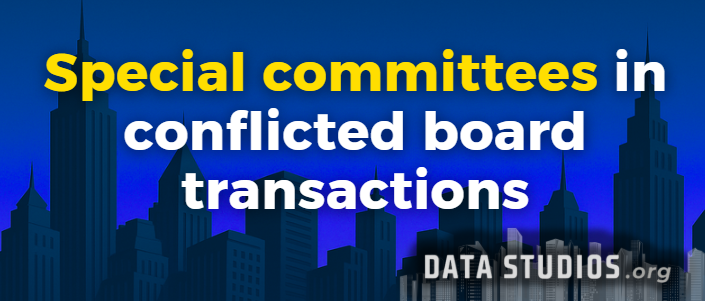Special committees in conflicted board transactions
- Graziano Stefanelli
- Aug 30, 2025
- 3 min read

In mergers and acquisitions (M&A) and other significant corporate transactions, special committees are formed when potential conflicts of interest exist among directors, executives, or controlling shareholders. These independent committees are tasked with evaluating, negotiating, and approving deals on behalf of minority shareholders to ensure decisions are made in their best interests. Special committees play a critical role in management buyouts (MBOs), related-party transactions, take-private deals, and any situation where directors face divided loyalties.
Special committees safeguard independent decision-making.
Boards establish special committees to ensure that conflicted transactions undergo objective review. Situations that trigger committee formation include:
Management-led buyouts → Executives attempt to purchase the company they manage.
Related-party acquisitions → Transactions involving significant shareholders or board members.
Parent-subsidiary mergers → A controlling shareholder seeks to acquire remaining minority stakes.
Cross-shareholding unwinds → Complex structures where multiple parties have interlinked ownership.
By separating decision-making from conflicted parties, committees strengthen governance, protect shareholder interests, and reduce legal exposure for directors.
Composition and independence are critical to committee credibility.
For a special committee to be effective, independence must be beyond reproach. Key elements include:
Aspect | Best Practice | Objective |
Director independence | Members must have no financial ties to conflicted parties | Ensure impartial judgment |
Number of members | Typically 2–5 directors | Maintain focused oversight |
Separate advisors | Independent legal and financial counsel | Avoid influence from conflicted directors |
Authority granted | Full power to approve, reject, or negotiate | Provide real leverage in decision-making |
Failure to maintain true independence exposes boards to litigation risks and undermines shareholder trust.
Special committees oversee fairness opinions and deal valuations.
When assessing conflicted transactions, committees typically commission fairness opinions from independent financial advisors to validate pricing and structure. Responsibilities include:
Evaluating valuation models such as DCF, comparable multiples, and precedent transactions.
Negotiating terms with potential buyers to secure better economics for minority shareholders.
Reviewing alternative offers and strategic options beyond the conflicted proposal.
Ensuring disclosure accuracy in regulatory filings and proxy statements.
Obtaining a third-party opinion strengthens the committee’s position and provides evidence of due diligence if the transaction is later challenged in court.
Delaware standards shape special committee responsibilities.
In the United States, Delaware case law—where many corporations are incorporated—establishes high standards for committees managing conflicted transactions. Two main legal frameworks guide judicial review:
Entire Fairness Standard → Applies when controlling shareholders are on both sides of a transaction. Committees must prove both fair price and fair process.
Business Judgment Rule → If committees demonstrate robust independence, proper authorization, and fairness, courts defer to their decisions.
A well-structured special committee helps boards achieve business judgment protection, reducing liability exposure while maintaining transaction credibility.
Regulatory and disclosure requirements influence committee formation.
Special committees are especially relevant in going-private transactions and cross-border acquisitions where regulators demand transparency:
SEC Rule 13e-3 → U.S. public companies going private must disclose the committee’s role in protecting shareholders.
Stock exchange governance codes → Require independent reviews of insider-driven transactions.
International FDI frameworks → Some jurisdictions demand special oversight when foreign parties are involved in conflicted deals.
Failure to disclose the committee’s findings or advisor relationships can lead to enforcement actions and litigation.
Best practices for effective special committee governance.
For committees to fulfill their fiduciary duties and withstand shareholder and judicial scrutiny, companies should:
Select fully independent directors with no material ties to conflicted parties.
Appoint separate financial and legal advisors reporting solely to the committee.
Maintain comprehensive documentation of deliberations, negotiations, and alternatives considered.
Conduct robust market checks to validate pricing fairness.
Ensure transparent disclosures to all shareholders throughout the process.
By following these practices, special committees enhance transaction integrity and protect minority shareholder rights.
Special committees build credibility and protect shareholder interests.
In conflicted M&A scenarios, special committees serve as a critical governance mechanism. They ensure decisions are made independently, negotiations are handled objectively, and minority shareholders are treated equitably. Well-functioning committees improve regulatory compliance, reduce litigation exposure, and strengthen confidence in the fairness of corporate transactions.
____________
FOLLOW US FOR MORE.
DATA STUDIOS




